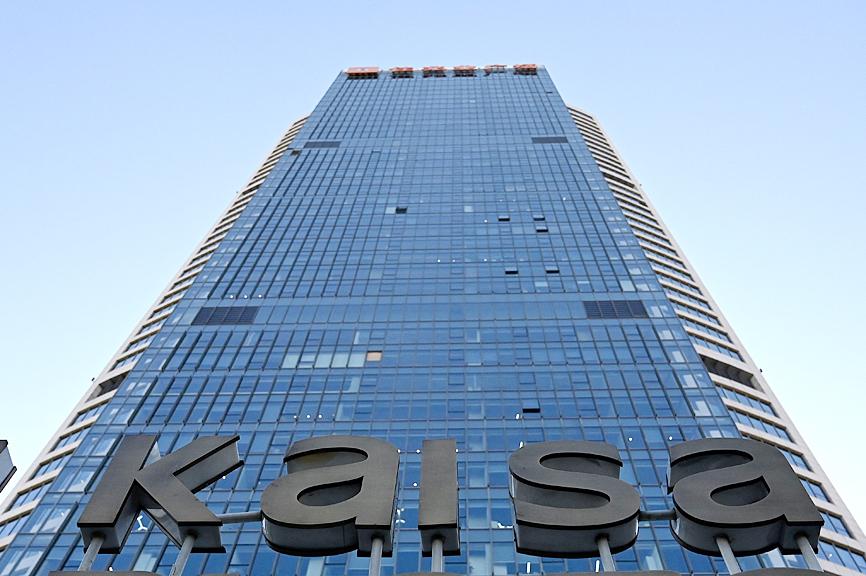Chinese property firm Kaisa Group Holdings Ltd (佳兆業集團) yesterday suspended share trading in Hong Kong as questions swirl over its ability to make repayments and contagion spreads within the nation’s debt-ridden real-estate sector.
Kaisa, China’s 27th-largest real-estate firm in terms of sales, but one of its most indebted, became the latest company to spook investors when it announced on Friday that it had failed in a bid for a debt swap that would buy it crucial time.
Yesterday morning the firm announced that it was suspending trading in Hong Kong, where it is listed, “pending the release by the company of an announcement containing inside information.”

Photo: AFP
It is the second time the company has suspended trading in the past month.
Kaisa last month announced a plan to delay the repayment timeline for some of its bonds, offering an exchange for at least US$380 million of notes, which would have given it some room to find money further down the line.
However, the offer failed to win the 95 percent approval from bondholders needed for the plan to go ahead.
The company currently has about US$11.6 billion of US dollar notes outstanding.
It had defaulted on a US dollar debt in 2015, becoming the first Chinese developer to do so.
The most indebted Chinese property firm is China Evergrande Group (恆大集團), which set off the current confidence crisis earlier in the summer.
The Shenzhen-based behemoth racked up an eye-watering US$300 billion in loans before Beijing began to rein in the sector.
On Tuesday, Evergrande missed a deadline to repay some of its overseas creditors, raising the prospect of it defaulting as it prepares for a government-backed mega-restructure.
Bloomberg News reported some of the US$82.5 million in overdue coupon payments it owed by the end of Tuesday — when a 30-day grace period ran out — remained unpaid.
Ratings group S&P has predicted that a default by Evergrande is now “inevitable.”
Kaisa and Evergrande have become the most visible faces of the debt crunch within China’s property sector, but defaults have rippled throughout the sector.
Bloomberg News reported that at least 10 lower-rated real-estate firms have now defaulted on onshore or offshore bonds since the summer.
Chinese borrowers have so far this year defaulted on a record US$10.2 billion of offshore bonds, with real-estate companies accounting for 36 percent of those non-repayments, Bloomberg reported.
Wealthy owners of at least seven Chinese real-estate companies have also sold off some of their own luxury assets in the past few weeks to help prop up their firms, Bloomberg added.

In Italy’s storied gold-making hubs, jewelers are reworking their designs to trim gold content as they race to blunt the effect of record prices and appeal to shoppers watching their budgets. Gold prices hit a record high on Thursday, surging near US$5,600 an ounce, more than double a year ago as geopolitical concerns and jitters over trade pushed investors toward the safe-haven asset. The rally is putting undue pressure on small artisans as they face mounting demands from customers, including international brands, to produce cheaper items, from signature pieces to wedding rings, according to interviews with four independent jewelers in Italy’s main

Macronix International Co (旺宏), the world’s biggest NOR flash memory supplier, yesterday said it would spend NT$22 billion (US$699.1 million) on capacity expansion this year to increase its production of mid-to-low-density memory chips as the world’s major memorychip suppliers are phasing out the market. The company said its planned capital expenditures are about 11 times higher than the NT$1.8 billion it spent on new facilities and equipment last year. A majority of this year’s outlay would be allocated to step up capacity of multi-level cell (MLC) NAND flash memory chips, which are used in embedded multimedia cards (eMMC), a managed

Japanese Prime Minister Sanae Takaichi has talked up the benefits of a weaker yen in a campaign speech, adopting a tone at odds with her finance ministry, which has refused to rule out any options to counter excessive foreign exchange volatility. Takaichi later softened her stance, saying she did not have a preference for the yen’s direction. “People say the weak yen is bad right now, but for export industries, it’s a major opportunity,” Takaichi said on Saturday at a rally for Liberal Democratic Party candidate Daishiro Yamagiwa in Kanagawa Prefecture ahead of a snap election on Sunday. “Whether it’s selling food or

In the wake of strong global demand for AI applications, Taiwan’s export-oriented economy accelerated with the composite index of economic indicators flashing the first “red” light in December for one year, indicating the economy is in booming mode, the National Development Council (NDC) said yesterday. Moreover, the index of leading indicators, which gauges the potential state of the economy over the next six months, also moved higher in December amid growing optimism over the outlook, the NDC said. In December, the index of economic indicators rose one point from a month earlier to 38, at the lower end of the “red” light.